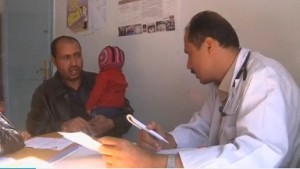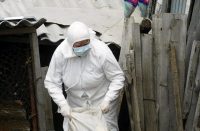
As the civil war in Yemen enters its ninth month, the humanitarian crisis engulfing the country is worsening, with 80 percent of the population requiring some form of humanitarian assistance and a health sector that is crumbling in the face of a debilitating siege.
Dozens of hospitals and clinics across Yemen have been damaged or destroyed in the war. Those that remain intact are overwhelmed by growing casualties, limited resources, and a fuel crisis exacerbated by a sea, land and air siege imposed on the country by the Saudi-led coalition forces fighting to oust the Iran-backed Houthis from their strongholds.
“The overall humanitarian situation in Yemen is nothing short of catastrophic. On average you have 25 people killed in Yemen every day, another 125 that are injured. This has been ongoing for more than eight months by now,” said the spokeswoman for the International Committee of the Red Cross in the Yemeni capital, Rima Kamal.
“The civilian population is suffering on multiple fronts. You have ongoing airstrikes, you have heavy ground fighting, and you have on top of that restrictions on the movement of goods and services,” she told Reuters in an interview in Sanaa on Sunday (December 13).
Frustrated at the deteriorating humanitarian crisis and rising civilian death toll, Western nations are quietly increasing pressure on Saudi Arabia to seek a political deal to end the war, U.N. diplomats said earlier this week.
While much of that pressure has been applied through discreet diplomacy, they said, the United States will shine a global spotlight on the conflict when it chairs a public United Nations Security Council meeting on Yemen on Dec. 22.
The Houthis and President Abd-Rabbu Mansour Hadi’s government, forced into exile last year after the Houthis advanced on the capital, have agreed to a seven-day ceasefire expected to start on Monday (December 14), the day before planned U.N.-sponsored peace talks in Switzerland, senior officials on both sides said on Saturday (December 12).
In the meantime, the situation on the ground continues to spiral out of control. The health sector has been one of the worst-hit since the start of the crisis, with hospitals and clinics becoming targets.
“Overall, and since the beginning of the conflict, we at the International Committee of the Red Cross, we have reportedly documented more than 100 attacks on healthcare facilities. A hundred attacks on hospitals and healthcare facilities since March,” Kamal said.
“This is a very high number. Hospitals are no longer the safe places they used to be. We have incidents where both patients and hospital staff have been killed or injured,” she added.
The Houthis have been locked in a war with forces loyal to President Hadi’s exiled government, who are backed by air strikes and ground forces from a mainly Gulf Arab coalition led by Saudi Arabia.
The Houthis, who control most of the northern part of the country, see the Arab alliance’s military operations in Yemen since March 2015 as an aggression. The alliance says it intervened in response to a request by Hadi.
A previous round of peace talks in June failed to reach an agreement, with both sides accusing each other of failing to offer compromises to end the conflict. In July, the two sides observed a five-day ceasefire, in which both sides traded accusations of violating the truce.
But both sides now say they are determined to end the crisis that has devastated the country and displaced more than two million Yemenis.
At one of the main hospitals in the capital, Dr. Mohammed Mansour pleaded for help.
“Our message to the world is relieve us, we are suffering from a major lack of medicines, necessary and life saving medicines. We are on the verge of a catastrophe,” he told Reuters on Sunday at the Jumhouri Hospital.
In Sanaa, one pharmacist says even the most critical medicines are no longer available, threatening the survival of patients.
“The health situation in Yemen is very unfortunate and sad. A lot of medicines are not available, including cancer medications, kidney failure medications as well as diabetes medications and stroke medications,” said pharmacist Mohammed Zeid.
The shelves at his pharmacy are sparsely stocked with many medications either running low or already out of stock.
The World Health Organization said on Saturday (December 12) that on Nov. 12, the death toll in Yemen since March was 5,878 people. A total of 27,867 had been wounded during the same period.
The UN High Commissioner for Refugees (UNHCR) and UNICEF, using slightly more recent data from late November and early December, said nearly half those killed were civilians, including 637 children.
More than 21 million people in Yemen require some kind of humanitarian assistance to survive – about 80 percent of the population – making it one of the worst humanitarian crises in the world.
The United Nations has led public criticism of the Saudi-led coalition over the humanitarian crisis and mounting civilian death toll. Last week UN Secretary General Ban Ki moon slammed the coalition for again striking a clinic run by the aid group Doctors Without Borders (MSF). (Reuters)







